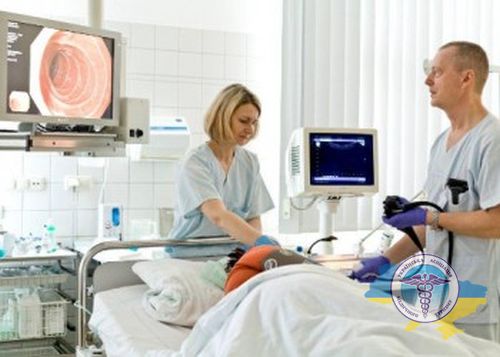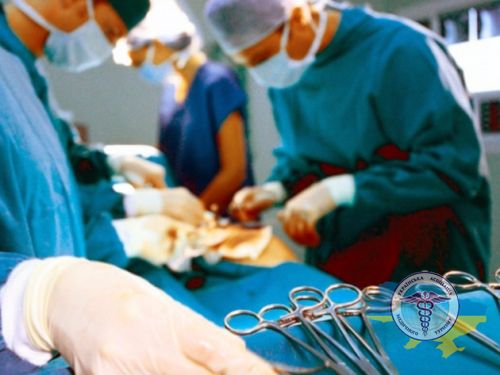Treatment of colon cancer in clinics of Germany

Malignant neoplasms of the colon, in particular its distal part - the rectum, represent a serious problem for modern oncology. They are characterized by an aggressive course, a tendency to early metastasis and often an unfavorable prognosis.
Unfortunately, in the early stages, colorectal cancer is practically asymptomatic. Therefore, timely diagnosis is key. Oncologists in German clinics use colonoscopy and CT colonography when examining patients, which makes it possible to identify precancerous changes in the initial stages, when radical therapy is still possible.
When treating rectal cancer in Germany, German oncologists always take into account the location and extent of the tumor process, the histological form of the lesion, and the general condition of the patient. This makes it possible to significantly increase the duration and improve the quality of life of patients.
For example, organ-conserving surgery in combination with pre- and postoperative radiation therapy is widely used to treat localized forms of the disease. For locally advanced and metastatic forms, along with surgical treatment, modern polychemotherapy and targeted drugs are prescribed.

Want to know how much the treatment costs?
Answer a few questions and get preliminary information about the cost of diagnosis and treatment!
Advantages of colorectal cancer treatment in German clinics
When treating rectal cancer in German clinics, patients receive a number of noticeable advantages compared to therapy at home:
- Widespread use of minimally invasive endoscopic and laparoscopic interventions. This reduces the trauma of the intervention, reduces blood loss, prevents complications and speeds up subsequent rehabilitation of patients.
- Use of innovative methods of therapy. German doctors practice organ-conserving operations in cases where this is possible. This allows you to remove the tumor as gently as possible, while preserving all intestinal functions.
- Integrated approach. The use of chemotherapy, targeted therapy, and radiation therapy both before and after surgery increases the effectiveness of treatment and reduces the risk of subsequent relapse.
- Use of the latest antitumor drugs. Medicines developed on the basis of targeted mechanisms of action on cancer cells make it possible to selectively damage cancer cells with minimal impact on healthy tissue.
- Careful monitoring of patients' condition after treatment. Due to this, possible complications and relapses can be identified in a timely manner. Doctors conduct regular examinations, examinations and analyze the dynamics of tumor markers.
- Individual approach. Treatment for each patient is selected individually, taking into account the characteristics of the tumor, concomitant diseases and the general condition of the body, which allows achieving the greatest effectiveness of therapy.
How is colon cancer diagnosed in Germany?

Diagnostics for the treatment of colon cancer in Germany allows us to establish an accurate diagnosis and stage of the disease, as well as develop optimal treatment tactics. As a rule, German doctors carry out:
- Collecting the patient's history and complaints. The oncologist conducts a detailed survey about the presence of abdominal pain, abnormal bowel movements, and blood in the stool. The doctor also finds out details about past illnesses, operations, and bad habits.
- Rectal examination. Makes it possible to assess the tone and patency of the anal canal, the condition of the rectal mucosa, the presence of pain, determine the size and location of the affected tissue.
- Computer tomography of the abdominal and pelvic organs. Gives an accurate image of the tumor, allows you to assess the involvement of surrounding tissues, lymph nodes and other organs in the process.
- Magnetic resonance imaging. Allows you to obtain high-resolution images of soft tissues and accurately visualize the tumor, as well as the extent of its spread.
- Positron emission tomography. A highly accurate diagnostic method that allows you to identify even small distant metastases throughout the patient’s body.
- Colonoscopy with biopsy. Endoscopic examination of the colon, which allows you to visually assess the malignant formation, its size, location, and take a biopsy for subsequent pathohistological examination.
- Blood test for tumor markers. An increase in the level of the tumor marker CEA in the patient's blood may indicate the presence of cancer cells. Dynamic control of marker levels is important for monitoring the course of the disease and assessing the effectiveness of therapy.
Methods of treatment of rectal oncology in German clinics

The level of development of medicine in Germany makes it possible to use a wide arsenal of modern techniques that allow achieving high efficiency in the treatment of colon cancer in German clinics.
The choice of the optimal treatment regimen is carried out by a council of experienced oncologists, taking into account the individual characteristics of the patient. This allows you to achieve the best results and avoid relapses in the future. German specialists use:
Surgical intervention
The basis of treatment is radical surgery, the goal of which is complete removal of the tumor along with regional lymph nodes. At the same time, depending on the location and size of the lesion, surgeons strive to preserve the function of the rectum as much as possible. Depending on the severity of the disease and its location, the following is used:
Transanal endoscopic microsurgery
This is one of the modern minimally invasive methods of surgical treatment of rectal cancer, which is effective only in the early stages. The essence of the method is to remove the tumor through the natural opening of the rectum using special endoscopic instruments and optical systems that provide high resolution.
This allows you to visualize the tumor as accurately as possible and perform its resection while preserving the surrounding tissue. Among the main advantages of transanal endoscopic microsurgery (TEM):
- No need for extensive incisions or colostomy formation.
- Minimal trauma and minor blood loss.
- Fast post-operative recovery.
- Preservation of rectal and anal sphincter function.
TEM has been used in Germany for more than 40 years. German surgeons have enormous experience and use the most modern equipment. This way you can achieve maximum efficiency, avoid complications and ensure excellent treatment results.
Total mesorectumectomy
The essence of the intervention is to excise the affected area along with the surrounding tissue - the mesorectum containing lymphatic vessels and nodes. Using this method, you can radically remove not only the tumor itself, but also potentially dangerous metastatic foci.
Among the advantages of total mesorectumectomy are:
- High radicality, which reduces the risk of relapse to 3-4%.
- Precise visualization of the surgical field and gentle tissue excision.
- Preservation of the function of the anal sphincter and nerve structures.
In Germany, this operation is performed using minimally invasive laparoscopic and robotic technologies. This allows us to minimize trauma and complications and ensure rapid recovery of patients after such extensive surgery.
Proctectomy
This is an extensive surgical procedure that involves removing the affected organ itself, as well as regional lymph nodes. Indications for proctectomy are:
- Rectal cancer in the inferior ampullary region (at a distance of less than 5 cm from the anal canal). In such cases, it is impossible to perform sphincter-preserving operations.
- Locally advanced forms of cancer involving the sphincter apparatus.
- Complex forms of cancer with bleeding and obstruction.
During the operation, the affected area is removed within healthy tissue and a colostomy is applied. Lymph node dissection allows you to remove regional lymph nodes, a potential source of metastases.
Removal of polyps
Colon polyps are benign neoplasms of the mucous membrane, which over time can transform into malignant ones. Therefore, timely removal of polyps is extremely important for preventing the development of cancer.
In German clinics, polyps are removed during colonoscopy. In this way, the polyp can be visually assessed and localized, after which it is removed using endoscopic forceps or a snare. This procedure is absolutely safe, does not require hospitalization and provides reliable cancer prevention.
Pelvic exenteration
This intervention is performed for locally advanced rectal cancer involving neighboring pelvic organs. It consists of removing the affected pelvic tissue along with the rectum, uterus or prostate gland, and the wall of the bladder.
Pelvic exenteration is extremely traumatic and often leads to the need for a permanent colostomy. However, it allows for complete removal of the tumor and prevents further progression of the disease. German surgeons strive to perform this intervention as gently as possible in order to minimize the postoperative recovery period.
Colostomy removal
Resection of the rectum for cancer often requires the application of a colostomy - an artificial outlet of the colon on the anterior abdominal wall. This is necessary to drain intestinal contents out into the colostomy bag. A colostomy can be temporary or permanent.
During sphincter-preserving operations with anastomosis between the preserved sections of the colon, a temporary unloading colostomy is formed. It closes 2-3 months after intestinal continuity is restored. But with complete resection with removal of the anus, a permanent end colostomy is applied.
Colostomy can be performed both through open and laparoscopic procedures. It should be noted that in German clinics, minimally invasive video-endoscopic operations predominate, which make it possible to shorten the rehabilitation period after surgery.
Conservative techniques
To enhance the effect in the treatment of rectal cancer in Germany, surgery can be used in combination with conservative approaches. Often used:
- Chemotherapy. It may be given preoperatively as neoadjuvant therapy to shrink the tumor and facilitate surgical removal. Chemotherapy is also prescribed after surgery as an adjuvant therapy to destroy possible micrometastases and prevent relapses. To increase efficiency, various combinations of antitumor drugs are used.
- Radiation therapy. It can be performed as a stand-alone method or in combination with chemotherapy. In German clinics, external beam radiation therapy is used on the latest generation linear accelerators with volumetric image simulation. This allows you to target the lesion as accurately as possible, while preserving the surrounding tissue.
- Targeted therapy. An innovative technique based on the use of targeted drugs that act selectively on cancer cells. These include monoclonal antibodies, angiogenesis inhibitors, tyrosine kinase inhibitors, etc. They block the growth and metastasis of a malignant neoplasm.
- Brachytherapy. Intracavitary irradiation, in which radioactive sources are injected directly into the tumor or surrounding tissue. Thus, a high dose of radiation is delivered locally, minimizing radiation exposure to healthy organs. Brachytherapy can be used in combination with other methods.
Cost of treatment for colorectal cancer in Germany
To find out the exact price for treatment of rectal cancer in Germany, provide our consultants with an epicrisis, complaints about the patient’s well-being, test results, as well as data from instrumental studies (MRI, CT, etc.). Based on them, the clinic’s doctors will draw up a treatment plan and provide an estimate.
The cost is usually influenced by the stage of the disease, the size and location of the tumor, the type of surgery, and the duration of therapy.
Approximate prices for individual procedures are shown in the table:
| Service | Cost, euro |
|---|---|
| Chemotherapy course | from 3000 |
| Radiation therapy course | from 2500 |
| Oncology examination | from 3000 |
| Consultation with an oncologist | 350 - 500 |
| Colonoscopy with biopsy | 1200 - 1700 |
| Histological examination | 500 - 2000 |
| Surgical intervention | 20000 - 30000 |



